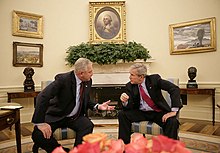Ivo Sanader
Sanader is to date the second longest-serving prime minister since Croatia's independence, holding the office for over five and a half years before resigning in July 2009.
In October 2018, Sanader was sentenced to two and a half years in prison for war profiteering and ordered to return $570,000 in kickbacks from Hypo Bank.
[4] He was one of five children so, as his family was financially unable to support their education, his mother asked the rector of the Archbishopric Classical Gymnasium to accept Ivo as a student.
[citation needed] In 1987, Sanader decided to return to Austria with his family,[11] where he co-founded two businesses, one in 1989 which was liquidated by a court in 1992, while the other existed between 1986 and 2001.
In October 1990, after multi-party system had returned to Yugoslavia, he founded the Tirol branch of the Croatian Democratic Union (HDZ) in Austria, and established contact with Franjo Tuđman.
Sanader's organizational skills, erudition, and fluency in German left a favorable impression on HDZ members with whom he collaborated in Austria.
From 1993 to 1995 and 1996 to 2000, he was a Deputy Minister for Foreign Affairs, overseeing the termination of required visas for Croatian citizens who traveled to Greece.
[citation needed] At the end of November 1995, he became Chief of Staff of the President of Croatia's office and General Secretary of the Croatian National Security and Defense Council (VONS) after Hrvoje Šarinić and Goran Drozdek were released from their duties.
Himself, Hrvoje Šarinić and Eytan Bentsur,[17] Vice Minister for Foreign Affairs in the Israeli government, met in Budapest in 1997, at which point diplomatic relations between Croatia and Israel were established.
Initially, Sanader criticized the unpopular International Criminal Tribunal for the former Yugoslavia (ICTY) indictments against Croatian Army generals.
Sanader, who was supported by Vladimir Šeks and convicted war criminal Branimir Glavaš, managed to win his second mandate.
[citation needed] After the victory of his Croatian Democratic Union (HDZ) the President of the Republic named Sanader the Prime Minister-designate on 9 December 2003.
As a result of the successful implementation of the Association Agreement – signed with the European Union in 2001 – Croatia did become an official candidate for entry into the EU.
[citation needed] Sanader was the last statesman to visit Pope John Paul II in Vatican City, in February 2005, a few weeks before his death on 2 April 2005.
[22] In October 2005, following the formal start of EU accession negotiations, opinion polls showed Sanader to be the most popular Croatian politician.
[23] Škare Ožbolt reported that Sanader possessed a collection of wrist watches worth in excess of €150,000 which he had not declared as assets.
The cabinet saw some changes during Sanader's term, notably the departure of the foreign minister Miomir Žužul who was accused of conflict of interest.
[26] Nacional, an independent political weekly, reported Sanader was a part of two bankrupt businesses in Austria, and received bribes in 1995 and 1996 from a tycoon amounting to 800,000 DEM.
[27][28] Owing in part to the global recession that set in during Sanader's term, Croatia's economic growth stalled and foreign direct investments slowed down.
On 1 July 2009, Sanader announced his resignation as the Prime Minister and Leader of the HDZ, as well as his complete withdrawal from all active politics, adding that he does not intend to return.
"[30] According to BBC News, the announcement "came as a surprise", as Croatian media had quite recently named Sanader as a potential candidate for the 2010 presidential election.
[32] On 3 January 2010, contrary to his earlier statements (1 July 2009), Sanader announced he would be returning to a more active role in politics, stating that his decision to withdraw was a mistake, and that the HDZ is a "winning party and not a party that wins 12% of the vote", a remark made in connection with the first round of the presidential election held one week before.
[34] On 4 January 2010, following an entire day of meetings of HDZ leadership, Ivo Sanader was expelled from the Croatian Democratic Union.
Of 22 members of the party presidency, 16 voted for expulsion, three were against (Luka Bebić, Mario Zubović and Damir Polančec) and two abstained (Bianca Matković and Petar Selem).
[43] Sanader is alleged to have received nearly $695,000 (£432,000) for arranging a loan from the Austrian Hypo Bank in 1995,[44] launching accusations of war profiteering,[45] and of receiving 10 million euros in bribes from the CEO of the Hungarian oil company MOL, Zsolt Hernádi, to secure MOL a dominant position in the Croatian oil company INA.
[51] According to calculations of Croatian news site Politika Plus from 2012, total damage done to the budget due to corruption scandals involving Sanader counts at least 207 million kuna.
[55] The judge, Ivan Turudić, said that Sanader had disgraced Croatia, adding that he had used his office for his own personal enrichment and not for the common good.
[citation needed] In June 2014, the Supreme Court of Croatia confirmed the 2012 verdict, but reduced Sanader's prison sentence to 8+1⁄2 years.
On 15 July 2014, President Ivo Josipović revoked all of Sanader's national decorations following the final judgment by the Supreme Court by which he was sentenced to imprisonment for a term of 8 years and 6 months due to his corruption while he served as Prime Minister.






